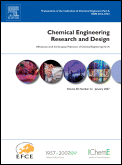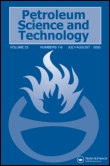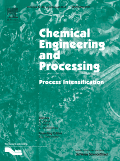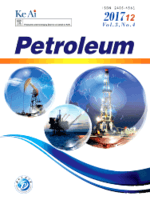
CHEMICAL AND PETROLEUM ENGINEERING
Scope & Guideline
Empowering Research for a Sustainable Future
Introduction
Aims and Scopes
- Chemical Process Engineering:
Research in this area includes the design, optimization, and simulation of chemical processes, focusing on improving efficiency and sustainability. - Petroleum Engineering:
A core focus on extraction, refining, and processing of petroleum resources, including studies on the environmental impact and optimization of oil recovery techniques. - Separation Technologies:
Innovative methods for separating mixtures, particularly in the context of industrial applications such as gas-liquid separation, filtration, and membrane technologies. - Thermal and Energy Engineering:
Studies focusing on heat transfer, energy efficiency, and thermal management in various engineering applications, particularly in energy-intensive industries. - Materials Engineering:
Research on materials used in chemical and petroleum processes, including their mechanical properties, corrosion resistance, and performance under various operational conditions. - Sustainable Practices:
Exploration of eco-friendly technologies and practices in chemical and petroleum industries, including waste treatment, pollution control, and sustainable resource management. - Computational Methods and Modeling:
Application of advanced computational techniques and simulations to predict the behavior of chemical processes and systems, enhancing design and operational efficiency.
Trending and Emerging
- Biomass and Renewable Energy:
A significant increase in research related to biomass processing and renewable energy sources, reflecting a global shift towards sustainable energy alternatives. - Nanotechnology in Engineering:
Emerging studies on the application of nanomaterials and nanotechnology in chemical processes, particularly in catalysis and materials improvement. - Advanced Separation Techniques:
An uptick in publications focusing on innovative separation methods, such as membrane technologies and hybrid separation processes, aiming to enhance efficiency and reduce environmental impact. - Computational Fluid Dynamics (CFD) Applications:
Growing interest in the use of CFD for modeling complex chemical processes, allowing for better design and optimization of industrial systems. - Environmental Impact Mitigation:
Increased research on technologies and methods to mitigate environmental impacts of chemical processes, including carbon capture and waste reduction strategies. - Digital Technologies and Automation:
Emerging trends in the integration of digital technologies and automation in chemical engineering processes, reflecting the industry's move towards Industry 4.0.
Declining or Waning
- Traditional Oil Recovery Techniques:
Research focusing on conventional oil recovery methods has decreased as the industry shifts towards more advanced and sustainable extraction techniques. - Static Equipment Design:
There has been a noticeable decline in publications related to the design of static equipment like pressure vessels and storage tanks, possibly due to a saturation of existing knowledge and a shift towards dynamic systems. - Basic Chemical Education:
The focus on foundational chemical engineering education topics appears to be waning, as the journal increasingly prioritizes innovative research and applied engineering solutions. - Low-Temperature Gas Processing:
Research in the area of low-temperature gas processing has seen a decrease, potentially due to advancements in other areas of gas processing technologies that are more commercially viable.
Similar Journals

Chemical Engineering Journal Advances
Advancing the Frontiers of Chemical Engineering Research.Chemical Engineering Journal Advances, published by Elsevier, is a premier open-access journal dedicated to advancing research and innovation in the field of chemical engineering. With its inception in 2020, the journal has quickly established itself as a key player in disseminating high-quality, peer-reviewed articles, boasting an impressive Q1 ranking in Chemical Engineering and related disciplines for 2023. The journal covers a broad spectrum of topics, including industrial processes, environmental chemistry, and innovative manufacturing techniques, making it essential reading for researchers and professionals aiming to stay at the forefront of chemical engineering advancements. With its commitment to open access, Chemical Engineering Journal Advances ensures that groundbreaking research is readily available to the global scientific community, fostering collaboration and knowledge exchange. Situated in the Netherlands, the journal supports its authors with a robust platform for impactful research dissemination, highlighted by a solid position in the Scopus ranks, indicating its influence and relevance in the field.

KAGAKU KOGAKU RONBUNSHU
Exploring Interdisciplinary Innovations in Chemical SciencesKAGAKU KOGAKU RONBUNSHU is a distinguished journal published by the SOC CHEMICAL ENG JAPAN, focusing on the interdisciplinary realms of chemical engineering and chemistry since its inception in 1975. With a commitment to advancing knowledge in these fields, the journal has established itself as a critical forum for researchers, professionals, and students alike, contributing to the understanding and application of chemical processes and materials sciences. Although it operates under a traditional publication model, the journal garners attention within the academic community, reflected in its Q3 rankings in both Chemical Engineering and Chemistry categories as of 2023. With the journal's ISSN 0386-216X and a comprehensive coverage spanning nearly five decades, it remains an essential resource for contemporary chemical research and developments, addressing ongoing challenges and innovative solutions in various applications. The journal invites submissions that reflect the latest advancements and insights in these fields, striving to foster a vibrant academic dialogue and support future innovations.

CHEMICAL ENGINEERING RESEARCH & DESIGN
Catalyzing Progress in Chemical Research and Application.CHEMICAL ENGINEERING RESEARCH & DESIGN is a prestigious journal that has been at the forefront of dissemination in the fields of chemical engineering and general chemistry since its inception in 1983. Published by Elsevier, the journal features a rich array of research articles that contribute to both theoretical and practical advancements in the discipline. With an impact factor that positions it strongly within the Q2 quartile for both Chemical Engineering and Chemistry categories, it occupies an esteemed place in the academic community, being ranked #77 out of 273 in Chemical Engineering and #111 out of 408 in General Chemistry on Scopus. Researchers and professionals will find it an invaluable resource for cutting-edge research and innovative methodologies that shape the future of chemical engineering applications. While the journal does not currently offer open access, it remains accessible through institutional subscriptions, ensuring that important findings continue to reach a broad audience. With a scope that is poised to expand through 2024, the journal aims to foster collaboration and knowledge sharing, supporting the continuous evolution of the field.

Results in Engineering
Unleashing Potential: Where Engineering Ideas Take FlightResults in Engineering is an esteemed open-access journal published by Elsevier, dedicated to advancing the field of engineering through high-quality, innovative research. Since its inception in 2019, this journal has rapidly established itself within the academic community, evidenced by its prestigious Q1 ranking in the Engineering (miscellaneous) category for 2023 and a remarkable ranking of #54 out of 307 in General Engineering according to the Scopus database, placing it in the 82nd percentile of its category. Located in the Netherlands, Results in Engineering provides a global platform for researchers, professionals, and students to disseminate their findings and foster collaboration across diverse engineering disciplines. The journal's commitment to open access ensures that valuable research is accessible to a wider audience, fostering innovation and knowledge sharing. With a progressive approach to publication, Results in Engineering seeks to enhance the engineering landscape by publishing cutting-edge studies that address contemporary challenges and solutions in the field.

PETROLEUM SCIENCE AND TECHNOLOGY
Exploring the intersection of engineering and energy technology.PETROLEUM SCIENCE AND TECHNOLOGY, published by Taylor & Francis Inc, is a pivotal journal dedicated to advancing the multidisciplinary field of petroleum engineering and related technologies. With an ISSN of 1091-6466 and an E-ISSN of 1532-2459, this journal serves as a vital platform for disseminating research in areas ranging from geotechnical engineering to energy technology. As of 2023, it is recognized in the Q3 quartile across several categories, including Chemical Engineering and Fuel Technology, signifying its respectable standing within the academic community. With a convergence timeline from 1997 to 2024, the journal continuously addresses crucial issues in the energy sector, making it essential reading for researchers, industry professionals, and policy-makers alike. Although not an open access journal, its rigorous peer-reviewed articles contribute significantly to the advancement of knowledge and innovation within these fields, reflecting the journal's commitment to promoting scientific understanding and practical applications.

China Petroleum Processing & Petrochemical Technology
Exploring breakthroughs in petroleum and petrochemical research.China Petroleum Processing & Petrochemical Technology is a critical journal published by the China Petroleum Processing & Petrochemical Technology Press, focusing on the pivotal advancements within the field of petroleum processing and petrochemical technology. With ISSN 1008-6234, the journal has been a significant resource since its inception in 1999 and aims to disseminate original research articles, reviews, and case studies that contribute to knowledge and innovation in energy engineering, fuel technology, and chemical engineering. Despite its current Q4 status in various quartile rankings, it provides essential insights and research that are invaluable for researchers, professionals, and students interested in these expanding areas. The journal is located in Beijing, China, and continues to strive for excellence in academia, encouraging contributions that address pressing challenges in the petroleum and petrochemical industries while fostering a deeper understanding of process chemistry and technology.

Chemical Engineering and Processing-Process Intensification
Exploring Efficiency in Chemical ProcessesChemical Engineering and Processing - Process Intensification is a leading journal published by Elsevier Science SA, specializing in the multifaceted domain of chemical engineering. With the ISSN 0255-2701 and E-ISSN 1873-3204, this journal stands as a beacon of knowledge, facilitating the dissemination of innovative research from 1984 onwards and continuing through 2024. Renowned for its rigorous peer-review process, it boasts a distinguished reputation, reflected in its top-tier rankings within several fields: Q1 in Chemical Engineering (Miscellaneous), Q2 in Chemistry, and Q1 in Industrial and Manufacturing Engineering. This journal focuses on the advancements in process intensification, which are crucial for optimizing efficiency and sustainability in chemical processes. Although access is not open, the journal serves as an essential resource for researchers, professionals, and students alike who seek to advance their understanding and contribute to the evolving landscape of chemical engineering and process technology. Join a community of innovators driving the future of process engineering through impactful and cutting-edge research.

ACS Engineering Au
Transforming Ideas into Engineering ExcellenceACS Engineering Au, published by the American Chemical Society, is an esteemed open-access journal dedicated to advancements in the field of engineering, encompassing a wide range of interdisciplinary studies that merge principles of chemistry with cutting-edge engineering practices. With an E-ISSN of 2694-2488, this journal aims to disseminate significant and innovative research findings that contribute to the development of sustainable technologies and solutions in various engineering domains. Since becoming an open-access journal in 2021, it has fostered greater accessibility and visibility for researchers and practitioners alike, encouraging collaboration and knowledge sharing across the global community. By providing a platform for high-quality research, ACS Engineering Au plays a pivotal role in shaping the future of engineering disciplines, making it an essential resource for academics, industry professionals, and students who are eager to stay at the forefront of engineering advancements.

Petroleum
Unveiling breakthroughs in fuel technology and earth sciences.Petroleum, an esteemed open-access journal published by KEAI PUBLISHING LTD, serves as a premier platform for disseminating high-quality research in the fields of energy engineering, fuel technology, geology, and related earth sciences. Established in 2015, the journal exemplifies innovation and scholarly rigor with a commendable ranking in the second quartile across multiple categories, including Energy Engineering and Geopolitics. With a focus on advancing knowledge and practices in the petroleum sector, it encourages submissions that encompass a broad spectrum of topics from exploration and extraction techniques to environmental impacts and sustainability measures. Based in Beijing, China, this journal's impact is further enhanced by its significant presence in the Scopus database, achieving impressive percentiles, such as the 95th for Geology and 93rd for Geochemistry and Petrology. The open-access model fosters unrestricted global collaboration and accessibility, making the latest research available to a diverse audience of researchers, professionals, and students eager to innovate and lead in the burgeoning energy landscape.

Engineering Review
Fostering innovation in engineering disciplines.Engineering Review is a prominent academic journal published by the University of Rijeka, Faculty of Engineering in Croatia. As an emerging outlet in the field of engineering, the journal has been providing a platform for interdisciplinary research since its inception in 2011, with a commitment to disseminating high-quality studies up to the horizon of 2024. Although currently categorized as Q4 in the Engineering (miscellaneous) section and ranking 242 out of 307 in General Engineering per Scopus metrics, the journal aims to bolster its impact and reach within the engineering community. With a focus on innovative approaches and practical applications in various engineering disciplines, Engineering Review invites contributions from researchers, professionals, and students alike, fostering a collaborative environment for the advancement of engineering research in a global context. While it is not an open-access journal at this time, it remains a vital resource for those engaged in cutting-edge engineering endeavors.